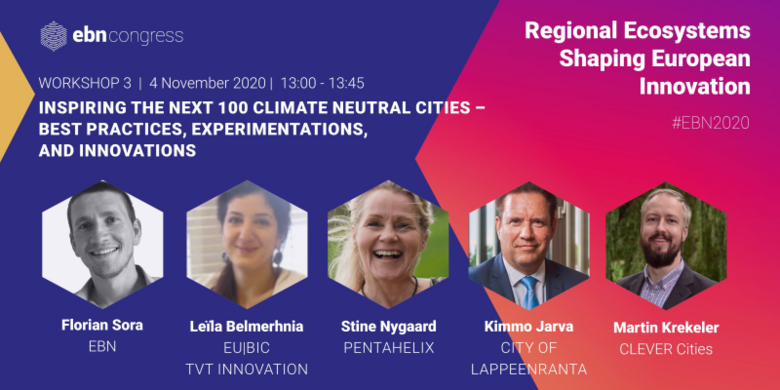Inspiring the next 100 climate neutral cities – best practices, experimentations, and innovations (EBN Congress 2020)
- Le mercredi 04 novembre 2020 de 13h45 à 14h15
- Europe et International
Inspiring the next 100 climate neutral cities – best practices, experimentations, and innovations
Context –problem statement:
Cities cover about 3% of the land on Earth, yet they produce about 72% of all global greenhouse gas emissions. On top of that, cities are growing fast; in Europe, it is estimated that by 2050 almost 85% of Europeans will be living in cities[1].
Cities are also the melting pot where decarbonisation strategies for energy, transport, buildings and even industry and agriculture coexist and intersect. As the density of use and infrastructure is higher in cities, there is also a higher potential for cross-sectoral integration and for complex infrastructures such as smart grids[2]. In addition, cities have access to more capital and know-how and can create the economies of scale necessary for the piloting and scaling up of new ideas and concepts.
Solution:
The climate emergency must be therefore tackled in cities. Equally important, it must be tackled by engaging citizens who are not only political actors in a governance structure, but also users, producers, consumers and owners. The mission of EU “Inspiring the next 100 climate neutral cities” will take into consideration multiple typologies of European cities in terms of size, spatial context, governance, budget and ability to mobilize the necessary financing, and the current level of climate action. It aims to use already existing innovation hubs and national, European and global forerunners that can promote technologies and innovative solutions for sustainable energy, transport, food, water and material systems. They will inspire additional urban areas, and eventually the whole of Europe, to accelerate their policies for climate action and transition
This session would focus on the need to have better-equipped cities to respond to the increasing challenges related to energy transition, greenhouse gases, mobility, or tourism. We would discuss how Nature-Based Solutions can create societal, economic, and environmental benefits in urban areas. We would also delve into empowering local and regional authorities to find innovative and cost-effective approaches for sustainable climate action plans. Lastly, we would hear about how EBN members contribute to develop eco & open-innovation smart city initiatives locally.
[1] https://ec.europa.eu/knowledge4policy/foresight/topic/continuing-urbanisation/developments-and-forecasts-on-continuing-urbanisation_en
[2] Final report of the High-Level Panel of the European Decarbonisation Pathways Initiative, p.112: https://ri-links2ua.eu/object/document/667/attach/ec-18-002-decarbonisation_booklet_27112018.pdf
Speakers
- Florian SORA, Project Manager at EBN – moderator
- Mr. Kimmo Jarva, Mayor City of Lappeenranta, Green Leaf Winner 2021 - Video (5-7 min no slides – 1 video)
- Leïla BELMERHNIA, R&D Smart Solutions Project Manager at EU|BIC TVT Innovation (no slides)
- Martin Krekeler of Senate Chancellery of Hamburg and coordinator of the CLEVER Cities project
- Stine Nygaard, CEO of “Klimapartnere Østfold”, PentaHelix Taskforce (5-7 min image only slides)


